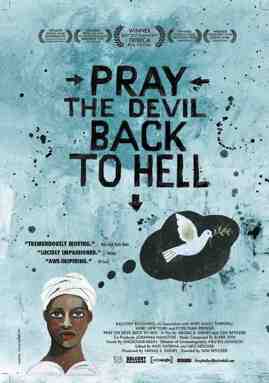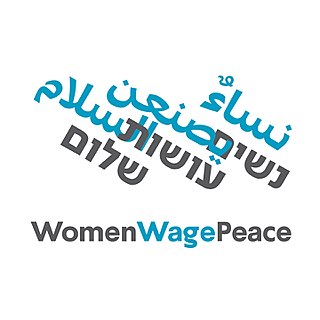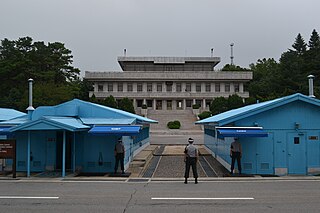Related Research Articles

The Women's International League for Peace and Freedom (WILPF) is a non-profit non-governmental organization working "to bring together women of different political views and philosophical and religious backgrounds determined to study and make known the causes of war and work for a permanent peace" and to unite women worldwide who oppose oppression and exploitation. WILPF has national sections in 37 countries.

A sex strike, or more formally known as Lysistratic nonaction, is a method of nonviolent resistance in which one or more persons refrain from or refuse sex with partners until policy or social demands are met. It is a form of temporary sexual abstinence. Sex strikes have been used to protest many issues, from war to gang violence to policies.

Pray the Devil Back to Hell is a 2008 American documentary film directed by Gini Reticker and produced by Abigail Disney. The film premiered at the 2008 Tribeca Film Festival, where it won the award for Best Documentary. The film had its theatrical release in New York City on November 7, 2008. It had cumulative gross worldwide of $90,066.

Women of Liberia Mass Action for Peace is a peace movement started in 2003 by women in Monrovia, Liberia, Africa, that worked to end the Second Liberian Civil War. Organized by Crystal Roh Gawding and social workers Leymah Gbowee and Comfort Freeman, the movement began despite Liberia having extremely limited civil rights. Thousands of Muslim and Christian women from various classes mobilized their efforts, staged silent nonviolence protests that included a sex strike and the threat of a curse.

Leymah Roberta Gbowee is a Liberian peace activist responsible for leading a women's non-violent peace movement, Women of Liberia Mass Action for Peace that helped bring an end to the Second Liberian Civil War in 2003. Her efforts to end the war, along with her collaborator Ellen Johnson Sirleaf, helped usher in a period of peace and enabled a free election in 2005 that Sirleaf won. Gbowee and Sirleaf, along with Tawakkul Karman, were awarded the 2011 Nobel Peace Prize "for their non-violent struggle for the safety of women and for women's rights to full participation in peace-building work."

Abigail Edna Disney is an American documentary film producer, philanthropist, social activist, and member of the Disney family. She produced the 2008 documentary Pray the Devil Back to Hell. Disney and Kathleen Hughes are producers and directors of Outstanding Social Issue Documentary Emmy Award winning The Armor of Light (2015) and The American Dream and Other Fairy Tales.
Aya Virginie Touré, born Aya Virginie Kouamé, is a peace activist and politician in Côte d'Ivoire. She became known for organizing women in nonviolent resistance against President Laurent Gbagbo who refused to step down since he lost the presidential election to Alassane Ouattara. Touré worked to mobilize women as the Deputy Director for Ouattara's 2010 Ivorian presidential election. In 2016, she was elected as a deputy in the 72nd circonscription which includes the cities of Guépahouo and Oumé. Since at least 2014, she has been the Executive Director of the Petroci Foundation, the caritative organization of the Ivorian oil and gas company.
Center for Justice and Peacebuilding (CJP) is an accredited graduate-level program founded in 1994. It also offers non-credit training. The program specializes in conflict transformation, restorative justice, trauma healing, equitable development, and addressing organizational conflict. CJP is housed at Eastern Mennonite University (EMU) in Harrisonburg, Virginia, which describes itself as "a leader among faith-based universities" in emphasizing "peacebuilding, creation care, experiential learning, and cross-cultural engagement." One of the three 2011 Nobel Peace Laureates, Leymah Gbowee of Liberia, earned a master's degree in conflict transformation from CJP in 2007.
Chocolate City is a central-northern suburb of Monrovia, Liberia. It is located in the New Georgia Township. Chocolate City contains the Elizabeth Blunt School and Francis Freeman Elementary School.

Mulheres Africanas – A Rede Invisível is a 2012 Brazilian documentary film written and directed by Carlos Nascimbeni.
Samuel Gbaydee Doe is a conflict, peace, and development professional from Liberia. Doe was a cofounder, with Emmanuel Bombande, of the West Africa Network for Peacebuilding (WANEP), based in Accra, Ghana. This organization focuses on collaborative approaches to conflict prevention and was founded in 1998 in response to the civil wars taking place in West Africa. The organization is known for their work with several regional partners such as the Economic Community of West African States (ECOWAS) and the African Union’s Economic, Social, and Cultural Council (ECOSOCC).
Emmanuel Bombande is a conflict resolution, peacebuilding, and development professional from Accra, Ghana, and is the Chair of the Board of the Global Partnership for the Prevention of Armed Conflict.
The West Africa Network for Peacebuilding (WANEP) is a leading Regional Peacebuilding organisation founded in 1998 in response to civil wars that plagued West Africa in the 1990s. Over the years, WANEP has succeeded in establishing strong national networks in every Member State of ECOWAS with over 550 member organisations across West Africa. WANEP places special focus on collaborative approaches to conflict prevention, and peacebuilding, working with diverse actors from civil society, governments, intergovernmental bodies, women groups and other partners in a bid to establish a platform for dialogue, experience sharing and learning, thereby complementing efforts at ensuring sustainable peace and development in West Africa and beyond.
Grace Beatrice Minor is an Americo-Liberian politician who served as the first female President Pro Tempore of the Senate from 2002 to 2003. She was senator for Montserrado County. Minor was a close ally of president Charles Taylor.

Women Wage Peace is an Israeli grassroots peace movement, formed shortly after the Gaza War in 2014. Its primary goal is to prevent future wars and promote a non-violent, respectful, and mutually accepted solution to the Israeli-Palestinian conflict, with the active participation of women from diverse political and religious backgrounds through all stages of negotiations.
PeaceJam Ghana is an annual Youth Leadership Conference that is built around the Nobel Peace Prize Laureates who work with young people with the aim of imparting their skills, knowledge and wisdom to them for community and sustainable development.

Ebenezer Norman is a Liberian philanthropist, humanitarian, public speaker, and founder of the education non-profit A New Dimension of Hope (NDHope). He is involved in humanitarian efforts in Liberia and throughout West Africa, notably for efforts to build schools in attenuated or war-torn communities after the Second Liberian Civil War in 2003 and the Ebola virus epidemic in Liberia in 2015.
Etweda Ambavi Gbenyon Cooper, known as Sugars, is a Liberian politician and peace activist. She has been described as "the doyenne" and "the godmother" of the Liberian women's movement.

Women Cross DMZ is a non-profit organization mobilizing women around the world to promote peace in Korea, as well as denuclearization and demilitarization of the Korean Peninsula. Founded in 2014 by Christine Ahn, a Korean American peace activist, the advocacy and education organization of feminists, lawyers and peace activists calls for a formal end to the Korean War and the replacement of the armistice agreement with a peace agreement. In 2015, WCDMZ made international headlines when it organized a historic crossing of the heavily armed De-Militarized Zone (DMZ) that separates North Korea from South Korea at the 38th parallel.
Events in the year 2019 in Liberia.
References
- 1 2 3 4 5 6 "Founders". www.wipsen-africa.org. Retrieved 2020-04-18.
- 1 2 Gbowee, Leymah. Mighty be our powers : how sisterhood, prayer, and sex changed a nation at war : a memoir. p. 108. ISBN 978-0-9842951-9-7. OCLC 833132672.
- 1 2 "Nobel Laureate Has Close Links to CJP – Peacebuilder Online". emu.edu. Retrieved 2020-04-18.
- 1 2 3 4 Afrigrants. "Meet The CEO". Afrigrants. Retrieved 2020-04-18.
- 1 2 3 4 5 6 7 8 9 10 "Thelma Ekiyor". Rising Leadership Foundation. Retrieved 2020-04-18.
- ↑ Lofton, Bonnie Price; Zucconi, Mike (2011-10-19). "Humility Links Nobel Winner and Alum Who Was Killed". EMU News. Retrieved 2020-04-18.
- ↑ Zucconi, Mike (2012-07-31). "Gbowee Carries Olympic Flag at Ceremony". EMU News. Retrieved 2020-04-18.
- ↑ Lofton, Bonnie Price (2011-10-07). "Nobel Prize Winner Connected to Peace-Church Tradition". EMU News. Retrieved 2020-04-18.
- ↑ Gbowee, Leymah. Mighty be our powers : how sisterhood, prayer, and sex changed a nation at war : a memoir. p. 186. ISBN 978-0-9842951-9-7. OCLC 833132672.
- ↑ Bailey, Razaan; Ekiyor, Thelma (2005-10-03). "Promoting Restorative Justice in South Africa's Correctional Services". Africa Portal. Retrieved 2020-04-18.
- ↑ Ekiyor, Thelma; Mashumba, Noria (2006-04-03). "The Peace-building role of Civil Society in Central Africa". Africa Portal. Retrieved 2020-04-18.
- ↑ Ginks (2007-11-09). "GINKS ICT4D stories in Ghana: Interview with Thelma Ekiyor of WACSI". GINKS ICT4D stories in Ghana. Retrieved 2020-04-18.
- 1 2 3 4 5 "Thelma Ekiyor". Concordia. Retrieved 2020-04-18.
- ↑ "About-Us". www.wanep.org. Retrieved 2020-05-11.
- ↑ Gbowee, Leymah. Mighty be our powers : how sisterhood, prayer, and sex changed a nation at war : a memoir. p. 109. ISBN 978-0-9842951-9-7. OCLC 833132672.
- ↑ "Women in Peacebuilding (WIPNET)". www.wanep.org. Retrieved 2020-04-18.
- ↑ Gbowee, Leymah. Mighty be our powers : how sisterhood, prayer, and sex changed a nation at war : a memoir. pp. 109–112. ISBN 978-0-9842951-9-7. OCLC 833132672.
- ↑ "Women in Peacebuilding (WIPNET)". www.wanep.org. Retrieved 2020-05-11.
- ↑ Gbowee, Leymah. Mighty be our powers : how sisterhood, prayer, and sex changed a nation at war : a memoir. p. 112. ISBN 978-0-9842951-9-7. OCLC 833132672.
- 1 2 Gbowee, Leymah. Mighty be our powers : how sisterhood, prayer, and sex changed a nation at war : a memoir. p. 188. ISBN 978-0-9842951-9-7. OCLC 833132672.
- ↑ Gbowee, Leymah. Mighty be our powers : how sisterhood, prayer, and sex changed a nation at war : a memoir. p. 187. ISBN 978-0-9842951-9-7. OCLC 833132672.
- ↑ Afrigrants. "Financial inclusion of women". Afrigrants. Retrieved 2020-04-18.
- 1 2 "Thelma Ekiyor appointed NACCIMA's MSME chairperson". Vanguard. 2020-04-06. ProQuest 2386449347 . Retrieved 2020-04-18.
- ↑ "Female Devt: UN Women seeks partnership". Vanguard News. 2018-01-24. Retrieved 2020-04-18.
- ↑ "Women and girls heartened to establish sustainable social and economic re-integration interventions". UN Women | Africa. Retrieved 2020-04-18.
- ↑ "TY Danjuma Foundation Appoints Thelma Ekiyor As First Executive Director – Press Releases on CSRwire.com". www.csrwire.com. Retrieved 2020-04-18.
- ↑ "TY Danjuma Foundation Commissions School Project". All Africa. 2011-08-19. ProQuest 884352245 . Retrieved 2020-04-18.
- ↑ Gbowee, Leymah. Mighty be our powers : how sisterhood, prayer, and sex changed a nation at war : a memoir. p. 107. ISBN 978-0-9842951-9-7. OCLC 833132672.
- ↑ "The Nobel Peace Prize 2011". NobelPrize.org. Retrieved 2020-05-11.
- ↑ Gbowee, Leymah. Mighty be our powers : how sisterhood, prayer, and sex changed a nation at war : a memoir. p. 114. ISBN 978-0-9842951-9-7. OCLC 833132672.
- ↑ "The Pan African Leaders Award: The 2015 ADI Nominees Who Inspire Humanity – African Democratic Institute" . Retrieved 2020-04-18.